Coalition government should dissolve Assemblies after change of command
THE coalition government can resign after the change of command in the military which, it appears, will be happening according to schedule and hand over the reins to a caretaker setup.
It can then begin campaigning in earnest against the PTI and challenge it through the ballot box.
A caretaker setup free to take difficult decisions may be able to make better progress on economic course correction as it won’t be concerned with its political costs.
Meanwhile, the defence forces, under a new leadership, would be better able to establish a distance from the political domain in a caretaker setup.
The government retains a constitutional right to complete its remaining tenure, but calling an election now seems a more reasonable route to take.
The country cannot continue limping and stumbling forward till August next year. With the nation at a crossroads, it ought to be left to the people to decide which path to take forward.
It is also critical for our parties to assess what their priority is self gratification or serving the people.
Now in these circumstances and current scenario it’s better for the interest of the nation that in the month of December in the year assemblies should be dissolved in consultation with the opposition parties and Pakistan Democratic Movement.
An opposition member of National Assembly introduced a private member bill in the National Assembly, seeking a ban on a candidate if he or she contests elections on more than two seats simultaneously.
The bill was tabled as lawmakers continued assailing the Pakistan Tehreek-e-Insaf for its ongoing protests, urging the federal government to deal with the situation as per the constitution.
The bill seeking an amendment to Article 223 of the Constitution, which allows any person to contest election on multiple seats, was tabled by MNA Abdul Akbar Chitrali, the Speaker NA referred the bill to the relevant House Committee after the government supported the move.
Anything contained in clause 1 shall not prevent any person from being a candidate for maximum two seats either in one assembly, or two assemblies at the same time.
The proposed amendment suggests that in case of winning both seats, the candidate will have to vacate one seat within 30 days.
According to Election Commission of Pakistan, they spent Rs.20 .7 million for conducting the election in one constituency.
Due to unprecedented inflation over the past few years, it is estimated that the Election Commission of Pakistan would be requiring Rs.
46 billion for the next national and provincial elections and if this amount is divided into the 272 National Assembly constituencies, then the expenditure on the one constituency would be around Rs.100.6 million.
It is unimaginable that a candidate contests elections on eight seats simultaneously and later retains only one seat.
It is a grave injustice with voters as well as great loss to the kitty and the country. Apart from the question of wasted finances, it is not fair to the voters to be asked to cast vote again and again.
Other states in the region have already placed limits on the number of seats a candidate can contest on.
India allows two simultaneous candidacies and Bangladesh three. It is in the interest of Pakistani democracy to place similar limits on running for multiple seats.
However, this will not be easy, as an amendment to Article 223 of the Constitution will be required to place limits on the number of candidacies, with a two thirds majority in Parliament.
At present, with an air of confusion prevailing over the length of time the current government has in the driving seat and with the PTI staying away from the legislature such a task looks impossible in the near future.
The next general election may also, therefore, feature candidates running from multiple seats.
But once some clarity is restored, both the new government and opposition must seriously consider making the required constitutional changes so that limits allowing candidates to run from only two constituencies simultaneously are put in place.
Pakistani society has always been divided on political grounds, but in recent times this trend seen an unprecedented rise, where politics has become a tool to exploit religious, ethnic and political opinions of people.
Some have become so efficient in this game that they successfully exploit conflicting opinions simultaneously.
The leaders alone are not a fault.At best, they can try to do all this because it suits them and their designs.
But it is an indication of the low, almost non-existent, level of political and social awareness in society that the majority fails to pick up such exploitative tendencies, and even when they know what is going on, they prefer to believe that it is happening for the larger good.
After all, everything is fair in love and war. It is all war and tactics are fair. The gloomy state of affairs in the country has squeezed the space for the multiple narratives to exist, causing public alternation.
Politics in a country where just about 50 percent people turn out to vote cannot survive such intense polarisation.
If this polarisation is not checked, it may unfold undesirable consequences for us in the long term.
—The writer is former Secretary Election Commission of Pakistan and currently Chairman National Democratic Foundation.










